![]()
The Words of the Vargas Family
|
|
The Words of the Vargas Family |

Excerpts of presentation at seminars during the Ambassadors for Peace Americas Tour Guatemala City and Santiago Atitlan, Guatemala, July 17-23, 2010
Today more than ever we need to reinforce our efforts to build collectively and at all levels a culture of peace, one of the greatest challenges being to enhance dialogue, understanding and sharing between and among cultures and religions.
The era that we are living in is unprecedented in all of human history. It is a time of rapid change. We are living in a time when one can connect to all the corners of the world through a small electronic device that fits in the palm of our hands, with the ability to obtain information on any topic or culture, news throughout the world, and send text messages from London to Africa, to Santiago and remote corners of the world.
Through the media and Internet, events happening on the opposite side of the world can reach us in a few seconds, impacting all nations instantly. The world has become one giant melting pot, where all cultures, traditions, and thoughts are being shared, experienced, challenged, and brought to us right in our very own homes.
With the advanced technologies available today, there has never been a more opportune time for peace. However, in spite of the technological advancements, humanity is still suffering from hunger, poverty disease and war.
In order to establish world peace we need to establish a culture of peace and a culture of heart. A culture of peace is a set of values, attitudes, ways of behavior, and ways of life that reject violence and prevent conflicts by tackling their root causes in order to solve problems through dialogue and negotiation among individuals, groups and nations.
For peace and non-violence to prevail, we need to:
foster a culture of peace through
education
promote sustainable economic and social
development
promote respect for all human rights
ensure
equality between women and men
foster democratic
participation
advance understanding, tolerance, and
solidarity
support participatory communication and the free flow
of information and knowledge
promote international peace and
security
Partnerships between and among the various actors should be encouraged and strengthened for a global movement for a culture of peace. This calls for the creation of a "grand alliance" of existing movements that unites all those already working for aspects of the culture of peace.
A culture of peace can only be achieved by a culture of heart. A culture of heart is living for the sake of others. It is living for the sake of the whole. It is a culture where in all aspects of society, from businesses, academia, the government, civil society, the media, and entertainment are geared for the sake of the whole.
Academia is responsible for institutionalizing the culture of peace through schools and universities by intensifying the teaching and practicing of character education and peacemaking curricula.
Educators of the world play a vital role in promoting the culture of heart in all educational institutions in order to raise up students and youth to be peace-loving world citizens and leaders who live for the sake of others, the key principle for world peace.
The culture of heart is learned in the family. The family is the cornerstone for world peace. If there is peace in the family there will be peace in the world.